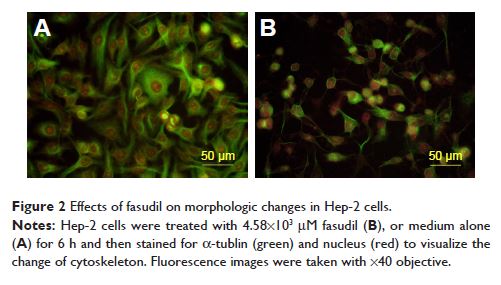9 0 6 7 6
论文已发表
注册即可获取德孚的最新动态
IF 收录期刊
- 2.6 Breast Cancer (Dove Med Press)
- 3.9 Clin Epidemiol
- 3.3 Cancer Manag Res
- 3.9 Infect Drug Resist
- 3.6 Clin Interv Aging
- 4.8 Drug Des Dev Ther
- 2.8 Int J Chronic Obstr
- 8.0 Int J Nanomed
- 2.3 Int J Women's Health
- 3.2 Neuropsych Dis Treat
- 4.0 OncoTargets Ther
- 2.2 Patient Prefer Adher
- 2.8 Ther Clin Risk Manag
- 2.7 J Pain Res
- 3.3 Diabet Metab Synd Ob
- 4.3 Psychol Res Behav Ma
- 3.4 Nat Sci Sleep
- 1.9 Pharmgenomics Pers Med
- 3.5 Risk Manag Healthc Policy
- 4.5 J Inflamm Res
- 2.3 Int J Gen Med
- 4.1 J Hepatocell Carcinoma
- 3.2 J Asthma Allergy
- 2.3 Clin Cosmet Investig Dermatol
- 3.3 J Multidiscip Healthc

法舒地尔抑制 Hep-2 喉癌细胞的增殖和迁移
Authors Zhang X, Wu N
Received 28 July 2017
Accepted for publication 12 January 2018
Published 23 February 2018 Volume 2018:12 Pages 373—381
DOI https://doi.org/10.2147/DDDT.S147547
Checked for plagiarism Yes
Review by Single-blind
Peer reviewers approved by Dr Colin Mak
Peer reviewer comments 2
Editor who approved publication: Dr Sukesh Voruganti
Background: Rho-kinase signal pathway is a new target for cancer therapy. Fasudil, a
selective Rho-kinase inhibitor, is found to exert antitumor effects on several
types of cancer, but whether fasudil has antitumor effects on laryngeal
carcinoma is still unknown. The aim of this study was to determine the effects
of fasudil on laryngeal carcinoma and explore the underlying molecular
mechanisms in this process.
Methods: After treatment with fasudil, changes in
biological behaviors, including the growth, proliferation, clone formation,
apoptosis, and migration of human laryngeal carcinoma cells (Hep-2 cells) were
observed. The influences on apoptotic protease activity factor-1
(APAF-1)-mediated apoptosis pathway and the activities of matrix
metalloproteinases (MMP-2 and MMP-9) were measured by Western blotting and
gelatin zymography assay.
Results: Half-maximal inhibitory concentration of fasudil to
Hep-2 cells was ~3.40×103 µM (95% CI:
2.53–4.66×103 µM). Moreover, fasudil treatment significantly
decreased the ability of growth, proliferation, clone formation, and migration
of Hep-2 cells, while remarkably increased the apoptosis rate. Furthermore, the
expressions of APAF-1, caspase-9, and caspase-3 significantly increased in
fasudil treatment group. Meanwhile, fasudil led to a remarkable decrease in the
expressions and activities of MMP-2 and MMP-9.
Conclusion: Our findings first demonstrate that fasudil not only
inhibits the proliferation of laryngeal carcinoma cells through activating
APAF-1-mediated apoptosis pathway, but also prevents migration by inhibiting
the activities of MMP-2 and MMP-9. Therefore, fasudil is an attractive
antitumor drug candidate for the treatment of laryngeal carcinoma.
Keywords: fasudil,
laryngeal carcinoma, apoptosis, apoptotic protease activity factor-1, matrix
metalloproteinase
